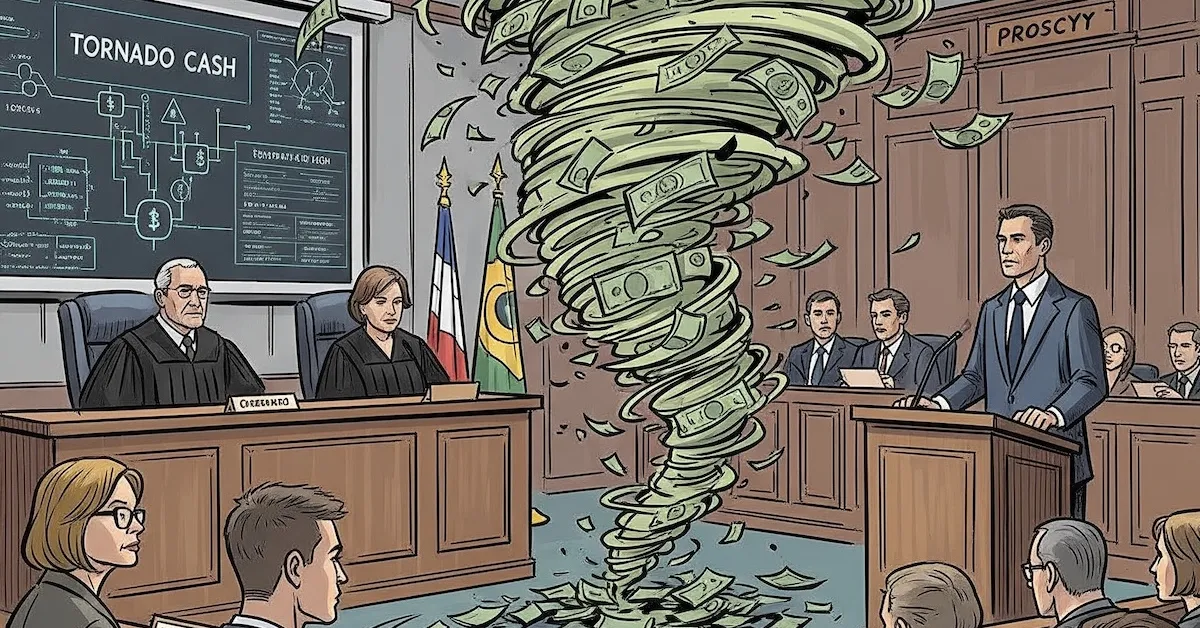Tornado Cash Verdict Drops: Roman Storm Convicted in Landmark Crypto Trial

The Tornado Cash trial, particularly its implications for developers of noncustodial Bitcoin and crypto technology and privacy-preserving software, has been a subject of significant scrutiny. Amanda Tuminelli, executive director and chief legal officer for the DeFi Education Fund, provided extensive insights into the high-stakes nature of the trial, viewing DeFi as encompassing Bitcoin. Her perspectives were highlighted during a segment of 'Bitcoin Politics,' coinciding with the third and final week of the trial, aimed at helping the public understand its conclusion.
In her analysis, Tuminelli outlined the three charges against Tornado Cash co-founder Roman Storm, delving deeply into the charge of conspiracy to operate an unlicensed money transmitting business. As an expert on 18 U.S. Code § 1960, the federal law prohibiting the operation of an unlicensed money transmitting business, Tuminelli asserted that Storm had not violated this statute in the creation and operation of Tornado Cash, an Ethereum-based crypto mixing service.
Further, Tuminelli discussed legislative efforts like the CLARITY Act and the Blockchain Regulatory Certainty Act (BRCA). Both acts contain language designed to protect developers of 'non-controlling' or noncustodial crypto technology, stipulating that such developers and purveyors do not require a money transmitting license and should not be subjected to existing money transmission laws.
Tuminelli also expressed concerns regarding the Department of Justice’s (DoJ) shift away from the 2019 FinCEN guidance. She argued that this shift threatens innovation within the crypto space and could lead to continued prosecutions of developers like Storm, despite an April memo from U.S. Deputy Attorney General Todd Blanche stating that the DoJ would cease targeting crypto entities, including mixing and tumbling services, for the acts of their end users. Tuminelli shared her thoughts on the trial's progression and potential defense strategies, and detailed amicus briefs submitted by the DeFi Education Fund for both the Tornado Cash and Samourai Wallet cases, although the brief for the former was rejected by the court.
However, the trial concluded with a significant verdict. Roman Storm was found guilty on the second count of his indictment: conspiracy to operate an unlicensed money transmitting business. This verdict, reached after three and a half days of jury deliberation following a trial that began in mid-July, carries a potential sentence of up to five years in prison. The jury did not reach a unanimous verdict on the other two charges, which included conspiracy to commit money laundering and conspiracy to violate sanctions.
Following the guilty verdict, the prosecution motioned to remand Storm into custody, alleging he was a flight risk. This motion was rejected by Judge Failla. Storm’s defense attorney, Ms. Klein, successfully argued against the prosecution’s claim, pointing out Storm's strong ties to the United States, including his Washington state home tied to a $2 million bail bond, his daughter (of whom he has partial custody) and girlfriend residing in the U.S., and his parents being green card holders. She also highlighted the significant support for Storm from the U.S.-based crypto community, which is expected to continue during his appeal. Judge Failla denied the remand motion, stating that the “stability of the verdict is still in play” due to the anticipated appeal, and that Storm's “incentives have shifted tremendously” in light of the conviction.
Shortly after the verdict, U.S. Attorney for the Southern District of New York, Jay Clayton, issued a statement. Clayton asserted, “Roman Storm and Tornado Cash provided a service for North Korean hackers and other criminals to move and hide more than $1 billion of dirty money.” He emphasized that while digital assets offer promise, this cannot excuse criminality, and committed his office to holding accountable those who exploit emerging technologies for illicit activities. He stated, “Criminals who use new technology to commit age old crimes, including hiding dirty money, undermine the public trust, and unfairly cast a shadow on the many innovators who operate lawfully.”
Notably, Clayton's statement did not acknowledge U.S. Deputy Attorney General Todd Blanche’s memo, which outlined the Department of Justice's intention to “stop participating in regulation by prosecution” in the crypto sector and to no longer target virtual currency mixing services based on the actions of their end users. Furthermore, Clayton's statement omitted the fact that the vast majority of funds transacted through Tornado Cash users were not proven to have been obtained illicitly.
You may also like...
AMG Unleashes a Beast: The GT2 Edition W16 Breaks Records, But Without Its Namesake Engine!

Mercedes-AMG has unveiled its most extreme customer racing car, the GT2 Edition W16, a track-only limited edition inspir...
Mercedes Shocks with G-Wagen Cabriolet Tease: Iconic SUV Goes Topless!

Mercedes-Benz has officially announced the return of the G-Class Cabriolet, slated for release in 2026, bringing an open...
US Gov Makes History: GDP Data Now Immortalized on Bitcoin Blockchain

The U.S. Commerce Department has begun publishing gross domestic product (GDP) data on public blockchains like Bitcoin a...
Tornado Cash Verdict Drops: Roman Storm Convicted in Landmark Crypto Trial

Tornado Cash co-founder Roman Storm has been found guilty of conspiracy to operate an unlicensed money transmitting busi...
Luxury Giant's Legacy: Armani's Empire Passes to Heirs After His Death

The fashion world mourns the passing of Giorgio Armani, who at 91, leaves behind an independent empire entrusted to his ...
AI Data Centers Exposed: $165 Billion 'Phantom Debt' Scandal Looms Over Tax Breaks

Doña Ana County, New Mexico, is pursuing an ambitious plan to become a major AI data center hub through 'Project Jupiter...
Political Titans Mobilize: Ambode & Speaker Tajudeen Lead Charge for Tinubu's 2027 Re-election Bid

Key political figures, including House Speaker Abbas Tajudeen and former Lagos Governor Akinwunmi Ambode, have publicly ...
Tinubu's Bold Naira Claim Sparks Fact-Check Fury: Was it N1,900/$ or N1,450/$?

President Bola Ahmed Tinubu recently claimed the naira strengthened significantly under his tenure, citing an improvemen...